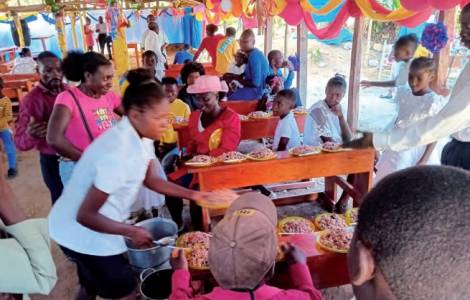
MM
by Father Massimo Miraglio*
Pourcine Pic Makaya (Agenzia Fides) – Every morning, around 250 children walk for hours along steep and dangerous paths to reach the primary and nursery school in Pourcine Pic Makaya, where the village is located. They come from hamlets scattered throughout the area: some climb from the nearby valleys, others descend from the top of the plateau, facing stony and slippery paths that become almost impassable in the rain or dew.
“Every morning, at 7:30, I stand at the entrance to the schoolyard to welcome our young heroes, aged between 4 and 14,” says a missionary present in the community. “Many arrive punctually and dressed up, within their means. Even the little ones, who travel long distances, have washed at the public fountain and put on their school uniforms.” Punctuality, however, is not always possible. “Are you late, Jean?” the missionary asks a child. “Father, I live in Loran. This morning my mother sent me to the fountain to get water, then I took the goat to graze… and the path is very slippery,” the little boy replies. It's barely 8:30 in the morning, and this seven-year-old has already covered several kilometers and completed multiple family chores.
“Falling ill at Pourcine Pic Makaya is a tragedy that must be avoided. The hospital is inaccessible and reserved for the most serious cases, who are carried by hand on a stretcher to the bottom of the valley (a six-hour walk) and then... by motorbike, or if you are lucky enough to meet one of the very rare cars that pass by, you can hope to reach the hospital in Jérémie, but many often die along the way.”
Illnesses, especially those that are not too serious, are treated at Pourcine Pic Makaya with traditional medicine, which combines the use of medicinal plants with rituals and beliefs that are more difficult to understand. In many cases, this medicine is effective and decisive, but there are situations that, due to their severity, require immediate treatment and the presence of professional personnel. In these cases, continuing to administer traditional remedies can have fatal consequences.
“In recent months, several people have died because of these 'false beliefs' fueled by cults. In Pourcine Pic Makaya, the parish priest's house has become a point of reference for all those who fall ill, whether it's a toothache, bronchitis, or a wound that needs treating... not to mention schoolchildren: parasites, fever, cough, wounds, and some then, with so much hope in their hearts, come from far away to seek a solution to even serious health problems.” “For the time being,” he continues, “what we can do is monitor the symptoms and help the person reach the bottom of the valley where, with luck, they may be able to reach the hospital. Every time I am amazed to see how a person in very poor health manages to make such an arduous and difficult journey. They arrive at the parish feverish or seriously injured, and from there they set off to reach the hospital. A people of heroes.”
“In 2024 and in this first part of 2025, some steps have been taken to improve the living conditions of the local community (see Fides, 5/3/2025). During 2025, we will continue along this path, despite the country's enormous difficulties. We will begin the literacy project for adults, maintenance work on some sections of the paths and mule tracks in the area, the second section of the aqueduct, and the safety of two other sources, the coffee nursery. The greatest challenge remains: building a small clinic to meet the population's significant health needs.”
(Agenzia Fides, 15/4/2025)
* Father Massimo Miraglio is a Camillian missionary of the Order of Ministers to the Sick, parish priest of Our Lady of Perpetual Help in Pourcine Pic Makaya.

MM